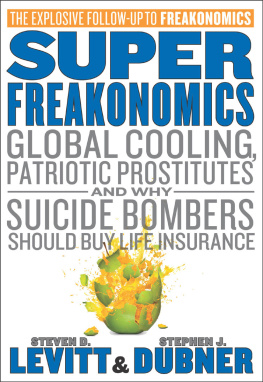Levitt Steven D - Think Like a Freak: The Authors of Freakonomics Offer to Retrain Your Brain
Here you can read online Levitt Steven D - Think Like a Freak: The Authors of Freakonomics Offer to Retrain Your Brain full text of the book (entire story) in english for free. Download pdf and epub, get meaning, cover and reviews about this ebook. year: 2014, publisher: HarperCollins, genre: Art. Description of the work, (preface) as well as reviews are available. Best literature library LitArk.com created for fans of good reading and offers a wide selection of genres:
Romance novel
Science fiction
Adventure
Detective
Science
History
Home and family
Prose
Art
Politics
Computer
Non-fiction
Religion
Business
Children
Humor
Choose a favorite category and find really read worthwhile books. Enjoy immersion in the world of imagination, feel the emotions of the characters or learn something new for yourself, make an fascinating discovery.

- Book:Think Like a Freak: The Authors of Freakonomics Offer to Retrain Your Brain
- Author:
- Publisher:HarperCollins
- Genre:
- Year:2014
- Rating:4 / 5
- Favourites:Add to favourites
- Your mark:
Think Like a Freak: The Authors of Freakonomics Offer to Retrain Your Brain: summary, description and annotation
We offer to read an annotation, description, summary or preface (depends on what the author of the book "Think Like a Freak: The Authors of Freakonomics Offer to Retrain Your Brain" wrote himself). If you haven't found the necessary information about the book — write in the comments, we will try to find it.
The New York Times bestselling Freakonomics changed the way we see the world, exposing the hidden side of just about everything. Then came SuperFreakonomics, a documentary film, an award-winning podcast, and more.
Now, with Think Like a Freak, Steven D. Levitt and Stephen J. Dubner have written their most revolutionary book yet. With their trademark blend of captivating storytelling and unconventional analysis, they take us inside their thought process and teach us all to think a bit more productively, more creatively, more rationallyto think, that is, like a Freak.
Levitt and Dubner offer a blueprint for an entirely new way to solve problems, whether your interest lies in minor lifehacks or major global reforms. As always, no topic is off-limits. They range from business to philanthropy to sports to politics, all with the goal of retraining your brain. Along the way, youll learn the secrets of a Japanese hot-dog-eating champion, the reason an Australian doctor swallowed a batch of dangerous bacteria, and why Nigerian e-mail scammers make a point of saying theyre from Nigeria.
Some of the steps toward thinking like a Freak:
- First, put away your moral compassbecause its hard to see a problem clearly if youve already decided what to do about it.
- Learn to say I dont knowfor until you can admit what you dont yet know, its virtually impossible to learn what you need to.
- Think like a childbecause youll come up with better ideas and ask better questions.
- Take a master class in incentivesbecause for better or worse, incentives rule our world.
- Learn to persuade people who dont want to be persuadedbecause being right is rarely enough to carry the day.
- Learn to appreciate the upside of quittingbecause you cant solve tomorrows problem if you arent willing to abandon todays dud.
Levitt and Dubner plainly see the world like no one else. Now you can too. Never before have such iconoclastic thinkers been so revealingand so much fun to read.
From the Back CoverThe New York Times bestselling Freakonomics changed the way we see the world, exposing the hidden side of just about everything.
Now, with Think Like a Freak, Steven D. Levitt and Stephen J. Dubner have written their most revolutionary book yet. With their trademark blend of captivating storytelling and unconventional analysis, they take us inside their thought process and offer a blueprint for an entirely new way to solve problems. The topics range from business to philanthropy to sports to politics, all with the goal of retraining your brain. Along the way, youll learn the secrets of a Japanese hot-dog-eating champion, the reason an Australian doctor swallowed a batch of dangerous bacteria, and why Nigerian e-mail scammers make a point of saying theyre from Nigeria.
Levitt and Dubner plainly see the world like no one else. Now you can too. Never before have such iconoclastic thinkers been so revealingand so much fun to read.
About the AuthorStephen J. Dubner is an award-winning author, journalist, and radio and TV personality. He quit his first careeras an almost-rock-starto become a writer. He has worked for The New York Times and published three non-Freakonomics books. He lives with his family in New York City.
Steven D. Levitt, a professor of economics at the University of Chicago, was awarded the John Bates Clark medal, given to the most influential American economist under the age of forty. He is also a founder of The Greatest Good, which applies Freakonomics-style thinking to business and philanthropy.
Levitt Steven D: author's other books
Who wrote Think Like a Freak: The Authors of Freakonomics Offer to Retrain Your Brain? Find out the surname, the name of the author of the book and a list of all author's works by series.

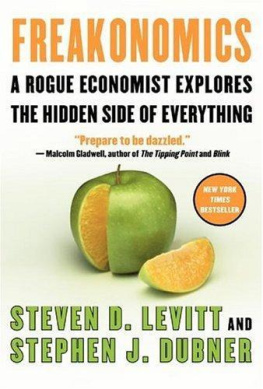
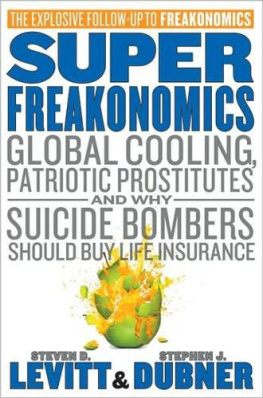
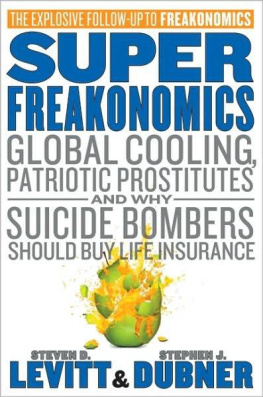
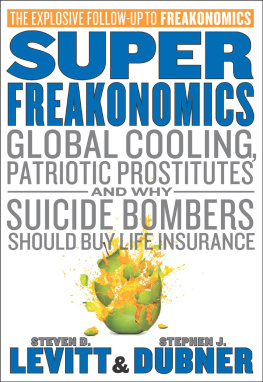
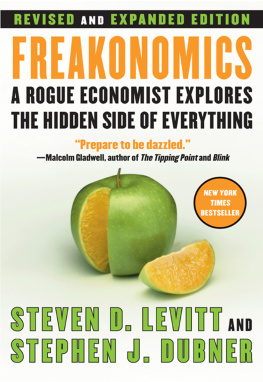
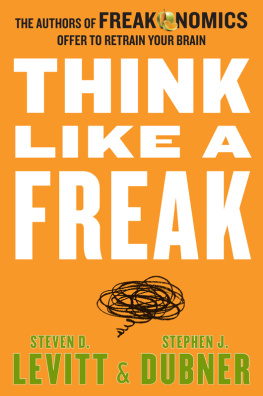
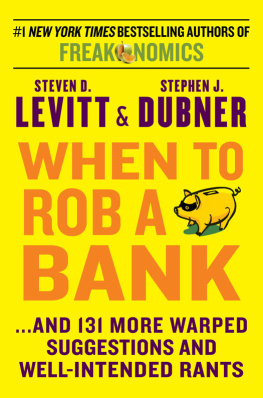
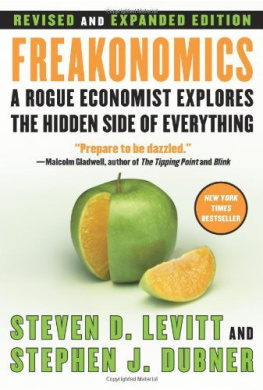
![Dubner Stephen J. - Super freakonomics : [global cooling, patriotic prostitutes and why suicide bombers should buy life insurance]](/uploads/posts/book/76604/thumbs/dubner-stephen-j-super-freakonomics-global.jpg)
